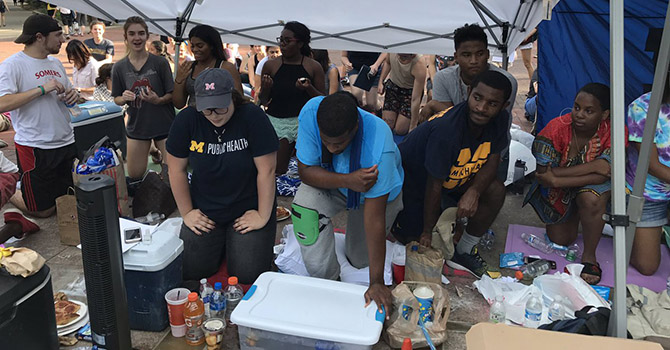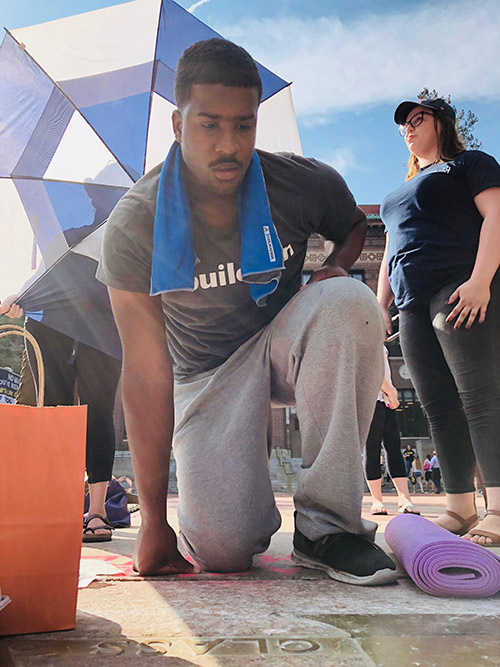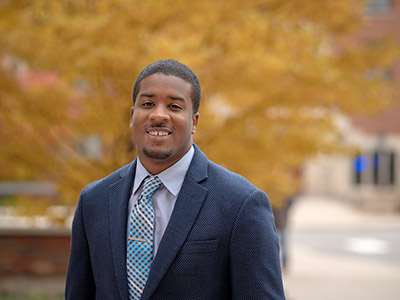One Year After

Dana Greene, Jr.
Master's Student, Health Behavior and Health Education
Acknowledgements: September 25, 2017, would not have been possible without the love and support of my fiancé, the woman who bore the burden of not only that day but the days to follow. Thank you, Jordan. I love you. I also want to acknowledge my family and friends who rallied behind me and made that day one I will always remember. And to Colin Kaepernick, who inspired this moment, thank you for giving me the courage to do this.
Three deep breaths. I remember taking them as I snuck out of my apartment around 5:30am on September 25, 2017. I remember feeling the moist air as I walked toward campus, thinking, “It’s an unusually humid day for late September.” I remember being scared—terrified—as I came closer and closer to campus.
I reached the heart of campus, the Diag. Still gathering my wits, I entered the Shapiro Library, finished the letter I wrote that morning, and sent it to President Schlissel and other university officials.
I looked out onto the sky dawning over campus one last time and knelt down onto the brick of the Diag. I was on the ground less than 15 minutes when the pain began.
Pain was the reason I was there. The pain of knowing that you could be on campus less than a month only to return to the N-word written on your dorm room door, of wearing a hijab only to be told you don’t belong, of going to pray only to find that the prayer rug had been urinated on, of painting the Rock with cultural pride only to be told that you should be deported. The pain of being called an SOB and told that you should lose your job for protesting police brutality.
I am here because men and women are dying because of police brutality and without justice. I am here because students on this campus are afraid to go class, or pray, or return home. I am here because we should be better than this.
So many people easily turn away from the sight of this pain. But this was the pain I was determined to display that day.
As the early hours of the morning passed, I watched hundreds of people walk past me. Close friends came to drop off yoga mats, water, and cooling towels.
I was afraid that, regardless of how long I stayed there, few people, if any, would care to know why I was there. Then a student I had never met before stopped and asked me why I was there, so I told him.
“I am here because men and women are dying because of police brutality and without justice. I am here because students on this campus are afraid to go class, or pray, or return home. I am here because we should be better than this.”
After hearing my reasons, the young man decided to say a prayer. While I am not a religious person, it meant so much for this person to share his faith with me in support.
From this moment on, the best of our campus and our country showed themselves repeatedly. At about noon I looked up and saw a young man carrying three cases of water. He dropped them off, introduced himself, and took a knee beside me. He remained there until I got up in the early hours of September 26—more than 20 hours after I first knelt down. He was the first of many people to join me. Their support is what made the day so meaningful.
By 4pm hundreds of people had joined the protest, each for their own reasons. Some joined because they wanted to support, some joined to understand, others joined to illustrate their own pain when experiencing discrimination and hate on campus and beyond.
I cannot speak to every reason that each person came to kneel, but I can say that every person who did was there in support of the person to their left and to their right. Regardless of their reasons for kneeling, a coalition of people from completely different backgrounds came together to support one another.

Despite all of this support, when I look back on that day, I often think about the negative. Why didn’t I stay longer? Why didn’t I have a list of demands or goals? Why does it feel like nothing changed?Why did I put my family at risk? I wish I could do more.
It’s easy for me to get caught up in those thoughts. Then I think about the Muslim Student Association joining in collective prayer while the Diag went silent. I think about the Native American student who sang a cultural prayer-song. I think about the dozens of students who remained into the early morning hours with courage and perseverance.
Since that day, I often ask myself how I can take that moment and turn it into a movement. The answer I have come to is that all moments do not need to become movements. When combined with wisdom and experience, a moment can be a catalyst. It can produce small miracles.
As I conclude the final year of my master’s program at the School of Public Health, I carry that moment with me. And I vow to carry the values of that moment into whatever work I may do in the future.
Advocacy can manifest itself in many ways, but it can never be individualistic. Advocacy is a collection of hopes, beliefs, values, and actions that act as a constant force striving to attain that which is most difficult to achieve. For me, it is the belief that all people are created equal and deserve to be treated as such—not just in the eyes of the law but, more importantly, in the eyes of one another.
September 25 was not about an individual but rather about hundreds, thousands, millions. The pain unheard and unseen. That day, for me, was a moment. For someone else, it was a moment, and for another, a moment. I guarantee that every individual who carries the values of that moment with them in everything they do will go on to create a moment for someone else and in another, and another, and another…and all those moments together can form a movement.
Imagine what 22 hours full of moments can do.
- The Story Behind a University of Michigan Student Who Took a Knee on the Diag for 20 Hours
- Read more articles by Health Behavior and Health Education students, faculty, and alumni.
- Interested in public health? Learn more.
About the Author
 Dana Greene, Jr., is a second-year master’s student at the University of Michigan
School of Public Health. He completed his Bachelor of Arts in Sociology at the University
of Michigan in 2016. On September 25, 2017, he took a knee on the University of Michigan Diag for over 20 hours to protest police brutality
and hate crimes across the country and the climate on campus.
Dana Greene, Jr., is a second-year master’s student at the University of Michigan
School of Public Health. He completed his Bachelor of Arts in Sociology at the University
of Michigan in 2016. On September 25, 2017, he took a knee on the University of Michigan Diag for over 20 hours to protest police brutality
and hate crimes across the country and the climate on campus.
